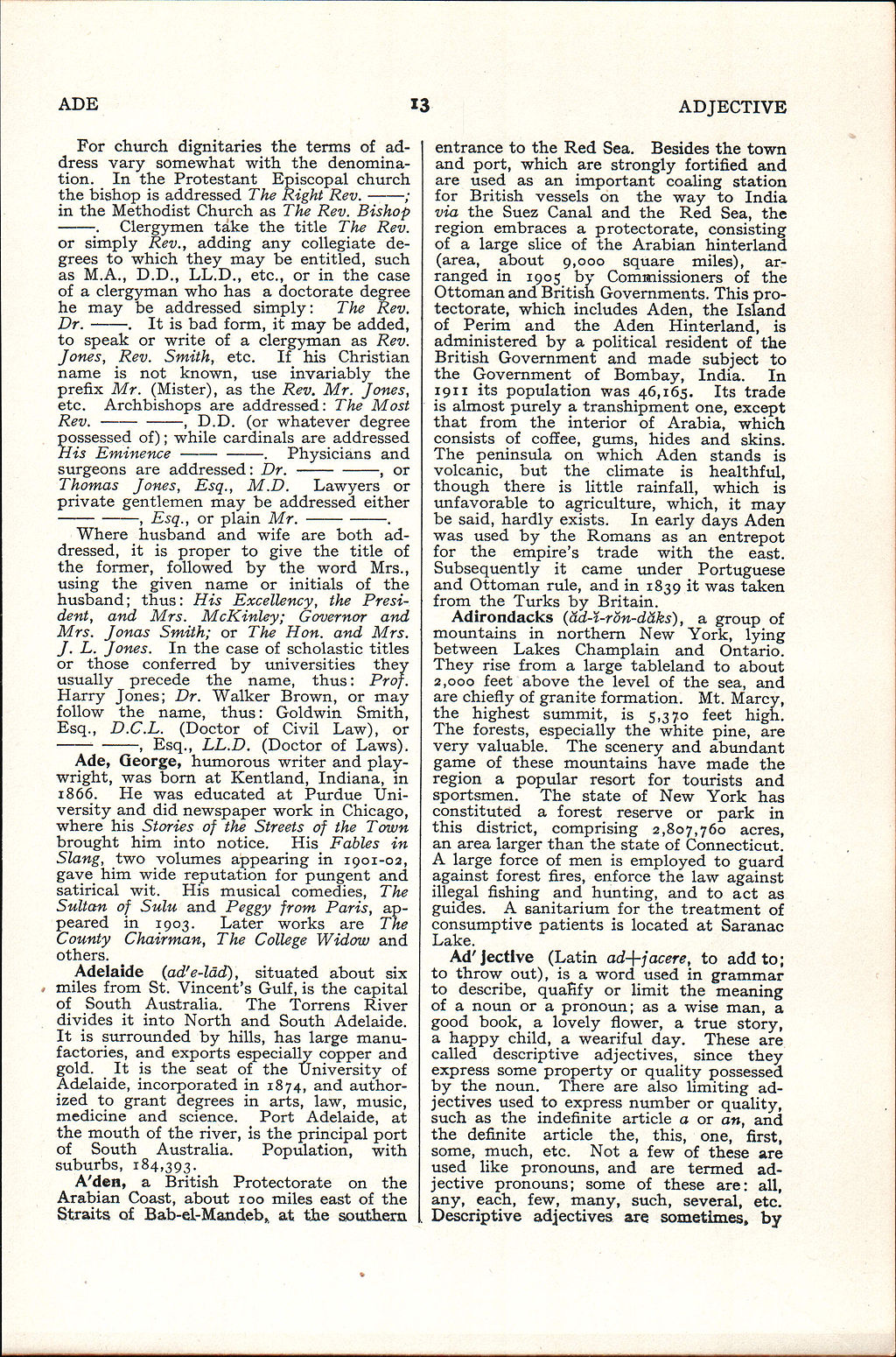For church dignitaries the terms of address vary somewhat with the denomination. In the Protestant Episcopal church the bishop is addressed The Right Rev. ; in the Methodist Church as The Rev. Bishop . Clergymen take the title The Rev. or simply Rev., adding any collegiate degrees to which they may be entitled, such as M.A., D.D., LL.D., etc., or in the case of a clergyman who has a doctorate degree he may be addressed simply: The Rev. Dr. . It is bad form, it may be added, to speak or write of a clergyman as Rev. Jones, Rev. Smith, etc. If his Christian name is not known, use invariably the prefix Mr. (Mister), as the Rev. Mr. Jones, etc. Archbishops are addressed: The Most Rev. , D.D. (or whatever degree possessed of); while cardinals are addressed His Eminence . Physicians and surgeons are addressed: Dr. , or Thomas Jones, Esq., M.D. Lawyers or private gentlemen may be addressed either , Esq., or plain Mr. .
Where husband and wife are both addressed, it is proper to give the title of the former, followed by the word Mrs., using the given name or initials of the husband; thus: His Excellency, the President, and Mrs. McKinley; Governor and Mrs. Jonas Smith; or The Hon. and Mrs. J. L. Jones. In the case of scholastic titles or those conferred by universities they usually precede the name, thus: Prof. Harry Jones; Dr. Walker Brown, or may follow the name, thus: Goldwin Smith, Esq., D.C.L. (Doctor of Civil Law), or Esq., LL.D. (Doctor of Laws).
Ade, George, humorous writer and playwright, was born at Kentland, Indiana, in 1866. He was educated at Purdue University and did newspaper work in Chicago, where his Stories of the Streets of the Town brought him into notice. His Fables in Slang, two volumes appearing in 1901–02, gave him wide reputation for pungent and satirical wit. His musical comedies, The Sultan of Sulu and Peggy from Paris, appeared in 1903. Later works are The County Chairman, The College Widow and others.
Adelaide (ad′e-lād), situated about six miles from St. Vincent’s Gulf, is the capital of South Australia. The Torrens River divides it into North and South Adelaide. It is surrounded by hills, has large manufactories, and exports especially copper and gold. It is the seat of the university of Adelaide, incorporated in 1874, and authorized to grant degrees in arts, law, music, medicine and science. Port Adelaide, at the mouth of the river, is the principal port of South Australia. Population, with suburbs, 184,393.
A′den, a British Protectorate on the Arabian Coast, about 100 miles east of the Straits of Bab-el-Mandeb, at the southern entrance to the Red Sea. Besides the town and port, which are strongly fortified and are used as an important coaling station for British vessels on the way to India via the Suez Canal and the Red Sea, the region embraces a protectorate, consisting of a large slice of the Arabian hinterland (area, about 9,000 square miles), arranged in 1905 by Commissioners of the Ottoman and British Governments. This protectorate, which includes Aden, the Island of Perim and the Aden Hinterland, is administered by a political resident of the British Government and made subject to the Government of Bombay, India. In 1911 its population was 46,165. Its trade is almost purely a transhipment one, except that from the interior of Arabia, which consists of coffee, gums, hides and skins. The peninsula on which Aden stands is volcanic, but the climate is healthful, though there is little rainfall, which is unfavorable to agriculture, which, it may be said, hardly exists. In early days Aden was used by the Romans as an entrepot for the empire’s trade with the east. Subsequently it came under Portuguese and Ottoman rule, and in 1839 it was taken from the Turks by Britain.
Adirondacks (ăd-ĭ-rŏn-dăks), a group of mountains in northern New York, lying between Lakes Champlain and Ontario. They rise from a large tableland to about 2,000 feet above the level of the sea, and are chiefly of granite formation. Mt. Marcy, the highest summit, is 5,370 feet high. The forests, especially the white pine, are very valuable. The scenery and abundant game of these mountains have made the region a popular resort for tourists and sportsmen. The state of New York has constituted a forest reserve or park in this district, comprising 2,807,760 acres, an area larger than the state of Connecticut. A large force of men is employed to guard against forest fires, enforce the law against illegal fishing and hunting, and to act as guides. A sanitarium for the treatment of consumptive patients is located at Saranac Lake.
Ad′jective (Latin ad+jacere to add to; to throw out), is a word used in grammar to describe, qualify or limit the meaning of a noun or a pronoun; as a wise man, a good book, a lovely flower, a true story, a happy child, a weariful day. These are called descriptive adjectives, since they express some property or quality possessed by the noun. There are also limiting adjectives used to express number or quality, such as the indefinite article a or an, and the definite article the, this, one, first, some, much, etc. Not a few of these are used like pronouns, and are termed adjective pronouns; some of these are: all, any, each, few, many, such, several, etc. Descriptive adjectives are sometimes, by
